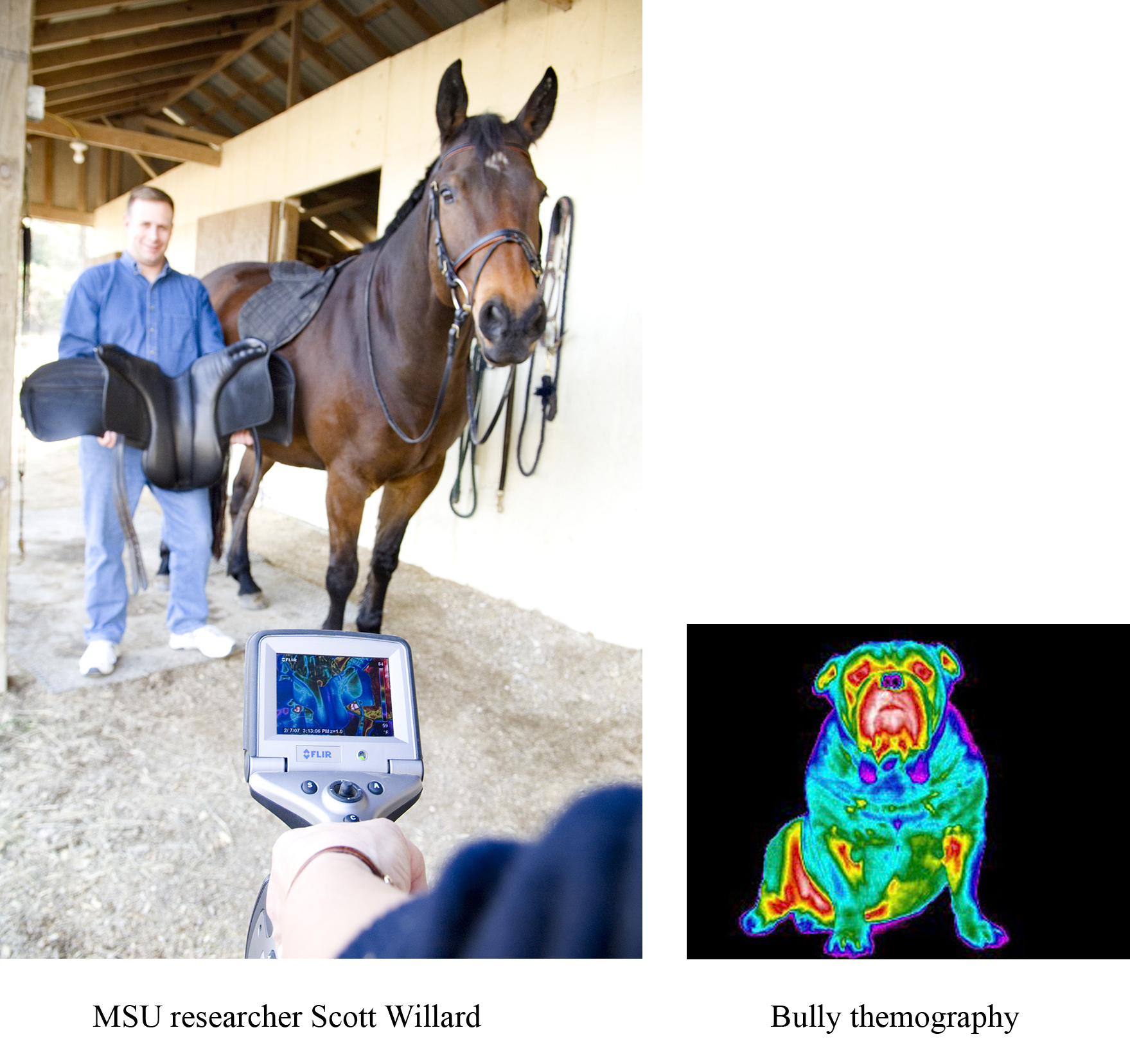Contact: Robbie Ward

Photo by: Megan Bean
STARKVILLE, Miss.--Until recently, Scott Willard of Mississippi State considered himself a bovine reproductive physiologist, not an entrepreneur selling artwork generated from thermal imaging or a provider of services and devices to fellow scientists.
An animal and dairy sciences department researcher at the university, he now is adding businessman to the professional hats he wears.
Willard recently established RAMS--an acronym for Remote Animal Monitoring Solutions--a company offering a variety of services and products to the livestock industry, as well as other research scientists and large animal managers.
The enterprise originated from his research at the land-grant institution. His business partner is Anna Chromiak, manager for another research program in animal and dairy science.
In addition to providing thermal imaging to help fit saddles on horses and the remote monitoring of livestock via the marketing and distribution of research devices (some of which are produced under contract with an international company), RAMS also creates artwork from thermal images generated from research that also can be used for diagnostic applications.
Through six years of MSU research with the Mississippi Agricultural and Forestry Experiment Station, Willard has created and modified various devices based on the needs of his work. As a scientist, he hasn't been alone in needing better devices to monitor livestock without having to physically handle the animals.
He said the impetus to create a company based on his research came from the longstanding Mississippi State efforts to create "spin-off" companies based on campus-based research. To that end, RAMS was selected to receive a $22,500 grant from the university's Thad Cochran Endowment for Entrepreneurship, which seeks to help potential entrepreneurs spark economic growth in the region and state.
RAMS is among the three companies to, so far, receive an endowment grant. The support is designed to help cover start-up costs associated with forming a new enterprise.
TCEE director Gerald Nelson said RAMS fits the profile for what the program seeks to do: make the university a breeding ground for the entrepreneurial spirit that will create jobs and additional entrepreneurial experiences for students, faculty, alumni, and others.
"The TCEE is all about creating a culture of entrepreneurship on the campus of Mississippi State," Nelson said.
Willard said coming up with an idea for the business didn't take much effort, since he regularly needed specialized devices and services for his own research.
"We're trying to develop new devices that are useful in our own research programs," he explained. "And, we believe they'll be important to other research programs, as well."
RAMS also has the potential to help fill a gap throughout the Southeast for providing thermography and ultrasound services to livestock producers and animal managers. Willard said he currently is developing monitoring devices that, when inserted, continually report body temperature or other factors without having to repeatedly disturb the animal.
"We can collect real-time data without having to impose additional stressors on the animal," Willard said.
In addition to data collection, Willard and Chromiak's company is working to help livestock producers utilize ultrasound services for determining optimal times to harvest their animals. To this end, RAMS is contracting with a certified ultrasound technician to determine factors like the intramuscular fat and rib-eye sizes of cattle, both key marketing factors for determining carcass value.
As for thermal imaging, the company's services have a variety of uses, Willard said. He cited their use in examining elephants and other very large animals by providing assessments of foot health for diagnostics associated with possible injuries, which can potentially be life-threatening for such heavy species. Thermography may be able to detect injuries much earlier than conventional methods when examining animals, which can mean faster treatment, he observed.
The Association of Zoos and Aquariums require X-ray or thermogram records of all elephant feet, and Willard said RAMS appears to be the only business providing this service to zoological institutions.
"There are no businesses in the South that provide thermographic services of this kind," Willard said. "We'll fill the niche of providing the thermography for those that want to use it."
While RAMS offers services and devices that one might traditionally expect from a research-spawned company, it is unique for producing art.
Willard and Chromiak are taking thermal photographs of landscapes, people, animals, and anything else. For $25, a customer can acquire an 8-by-10-inch digital print of a vivid colorized rendering of the thermal-patterned subject. Their company also offers custom images and Internet thermal prints.
"People can get an image of their horse as an artistic rendering," Chromiak said. "It's something no one else does in this country."
With their business services firmly in place, Willard and Chromiak currently are seeking to open a go-to commercial operation in Starkville.
"In the next few weeks, we'll be putting out our shingle," Willard said.
For more information on RAMS, visit www.rams-online.com.
----------------------------
NEWS EDITORS/DIRECTORS: Dr. Willard may be reached at 662-325-0040 or swillard@ads.msstate.edu; Ms. Chromiak, at 325-8210 or achromiak@ads.msstate.edu; and Mr. Nelson, at 662-325-8423 or gnelson@engr.msstate.edu.
For more information about Mississippi State University, see http://www.msstate.edu/.